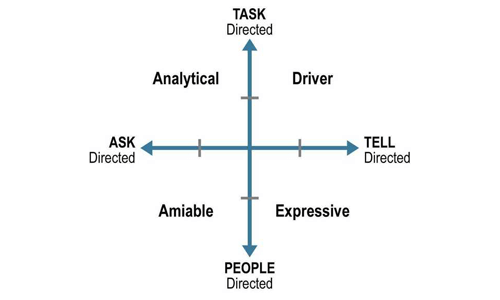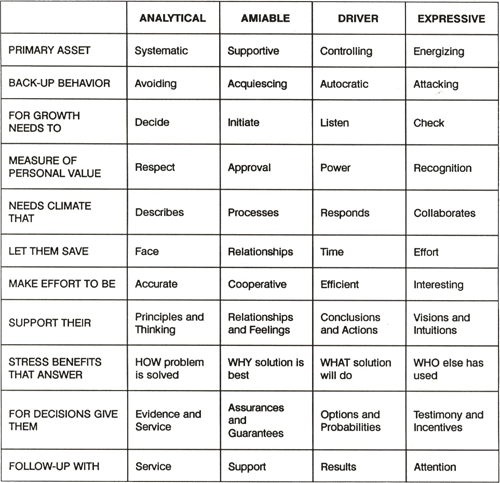Learning & motivation styles // Dealing with tough students March/April 2019
The benefits of understanding and using social styles:
- Often poor student-teacher interactions stem from simply not understanding how to motivate or communicate with your student.
- Understanding your student's social style your will help you teach with maximum results for the least effort.
- It's easiest to make a good first impression if you your student's social style.
Everyone can be categorized into one of four Social Styles:
- Driving,
- Expressive,
- Amiable or
- Analytical.
It’s pretty easy to figure out what bucket you, or anyone else, fall into by asking the following questions:
- Is the person more task oriented or more people oriented?
- Does the person tend to ask more questions or tell others what to do?

Before we dive into each type, a few caveats:
- Humans are infinitely complex. Every person is a mixture of the four social styles. However, in most cases, one is dominant.
- There are many other ways of measuring people, from Myers-Briggs to the Big Five personality traits. They are great and serve separate purposes. For our purposes, we'll focus on social styles.
- The pieces of advice may not always be not best-practice teaching methods. Rather, they are relationship-building tools that you can use to work towards best-practice teaching.
Tor teaching and training purposes, let's focus on understanding dominant social styles and try to use them to communicate to other teachers.
Driving
Goal oriented
Driving people get energy from setting and achieving goals
Here are the major attributes of a driving person
- Love accomplishing goals
- They will often come to class with a specific aim.
- "I want to read this article today."
- "Let's do the textbook."
- They will often come to class with a specific aim.
- Find small talk tiresome
- They typically like to get down to business.
- In some cases, a driving person will be socialized to make small talk, but it can feel abrupt or forced, and when you get to know them well they may prefer to avoid it altogether.
- Will be disappointed if their goals are not understood or met
- If your student presents a goal right off the bat, they may appreciate you checking the parameters.
- "This looks like a long article. Would you like to try and finish the whole thing, or just read part with some discussion?"
- "Okay, we're starting page 42. By the way, how much of the textbook have you prepared for?"
- If your student presents a goal right off the bat, they may appreciate you checking the parameters.
Dos & Don'ts
- Don't challenge their plans. If the student has a bad plan, the safest choice is, at the end of the lesson, to suggest a different approach next time. Back up your advice with references to deeper goals.
- In some cases, it is possible to change their plans, but it should be done with humility. Ask for permission. Make sure you reference deeper goals (such as expanding and retaining vocabulary, improving delivery in the GBC, that kind of thing) to get the on your side.
- Don't rush, even if they want to. Remind them of higher goals. The goal is to use the language smoothly and well. The goal is not to finish the less as quickly as possible. Ask challenging questions and call them out for not using target language.
- Do be more direct. You can say, "you didn't use the target language!"
- Do stay on track. If an interesting side topic comes up, enjoy a short chat but reference the goals they laid out at the beginning of the lesson.
- "This is really interesting! But, at the beginning of the lesson, you said you wanted to ---. Do you have any more to add about this topic, or should we go back to ---?"
- Do (try to) enjoy your time. Drivers like to get down to business quickly, but that doesn't mean the lesson has to be all about the course material. Expand, challenge them, ask questions to get to know them better. Just, don't start with that.
Analytical
Understanding oriented
Analytical people get energy from gaining understanding
Here are the major attributes of an analytical person:
- Love understanding deeply.
- They prefer to take it slow and clarify nuance.
- "Do you have any questions about this?"
- They prefer to take it slow and clarify nuance.
- Love detail, but can get caught in the weeds.
- Be patient and keep answering until the questions run out.
- "Any more questions?"
- Be patient and keep answering until the questions run out.
- Typically enjoy information input
- You can up your talk time when the student is analytical. They are there to learn.
Dos and Don'ts
- Don't rush. Analytical people learn slowly and well. It may seem like they are moving slowly or need a lot of explanation, but that is only because they want to wrap their head around it.
- Do correct with an explanation. While driving people just wanna hear the correction and move on, analytical people want to understand why it was a mistake and how not to make it in the future.
- I think I heard you say "I'm going to have a lunch" but we don't use an article there, because lunch isn't countable. We can have a hamburger, have an apple, have a lunchbox. But just have lunch, have dinner."
- Do ask questions with clear parameters, or help them to set the parameters.
- What do you think of the future of the Japanese economy in the mid-term, like in 5-10 years?
- Do agree with their process and conclusions. Analytical people put a lot of work into coming up with their answers. A bit of praise goes a long way.
- "Your point about working mothers is really insightful. That was a very logical and impactful answer."
Amiable
Relationship oriented
Amiable people get energy from your approval or your direction.
Here are the major attributes of an amiable person:
- Want to make sure you are happy (and especially happy with them).
- They take praise and compliments well.
- Just begin every piece of feedback with a positive word to put them at ease. "Good, well done, etc.."
- They take praise and compliments well.
- Take direction very well.
- In fact they may get flustered if they have to make too many choices.
- "Let's continue with the course."
- In fact they may get flustered if they have to make too many choices.
- Good listeners
- Amiable people want to hear from you about your life. Be mindful of your talk-time.
- Are careful with their opinions
- They don't want to offend you by saying they like something that you don't like.
- "I loved visiting Tokyo. What do you think about living there?"
- "Most of my students are pretty negative about the future of the Japanese economy. I wonder, what do you think about the future of the Japanese economy?"
- They don't want to offend you by saying they like something that you don't like.
Dos & Don'ts
- Don't start the lesson with too many questions. Amiable people find questions, especially opinion-based questions stressful. You can model answer to show them how you want them to answer.
- If you want an amiable person to do something, you have to tell them to do it, and show them what you expect.
- My favorite food is ramen. I love it! What's your favorite food?
- If you want an amiable person to do something, you have to tell them to do it, and show them what you expect.
- Don't expect strong opinions. Even though an amiable person might have strong opinions, their goal is to build a relationship. That means they will be reluctant to share their opinions.
- Don't focus on negatives. If they make a mistake, then just skip to what they should have said. Don't give them their
- Do give clear direction.
- This is the most difficult part of teaching an amiable person. They may not come out and tell you what they want. When you offer a choice, be mindful that they will prefer to say "yes".
- "Do you have any special English questions, like, a new word you heard, or a new goal that's come up?"
- This is the most difficult part of teaching an amiable person. They may not come out and tell you what they want. When you offer a choice, be mindful that they will prefer to say "yes".
- Do praise them. Of all the social styles, amiable people take praise the best. Of course, be specific and honest, but support their efforts, their feelings, and their successful attempts.
- Do show understanding. Take time to show that you understand them. Agree with whatever opinions you can find to agree with.
- Do share stories. Have fun! You can show your emotional side—something you've enjoyed recently or something surprising that happened, or whatever. Amiable people love to hear about how you feel about things.
Expressive
Emotion/idea oriented
Expressive people get energy from telling/showing you how they feel or what they think.
Here are the major attributes of an expressive person:
- Love to give opinions about personal topics
- Just asking, "How's it going?" Can lead to a rabbit hole of stories.
- Are feeling-oriented, and therefore are difficult to control.
- They tend not to like "dry" lessons that focus too much on the course. They want to implement the language immediately.
- Also, the goal of showing their feelings can overshadow the goal of learning language. They may want to switch to their native language or use a translator to say what they mean, with no regard for absorbing new language.
- The songs, "If It Feels Good, Do It" and "All I Wanna Do (Is Have Some Fun)" are their anthems.
- Expressive people tend to be more artistic, more open, more energetic.
Dos and Don'ts
- Do ask fun question and take breaks if the energy is lagging. Just ask their opinion or reference something in their profile.
- You can even ask these nearly out of the blue, "by the way, are you into ---?!" Expressive people tend to be quite lateral and won't mind straying from the topic.
- Don't lose track of the time. Steering an expressive person towards the course can be like steering a rodeo bull. It's honestly not always possible.
- Tie their feeling into the course, if possible.
- "You want to tell a good story? Let's take a look at this STS lesson, and I'll show you how!"
- Tie their feeling into the course, if possible.
- Don't give your opinion too much. They don't care as much about your opinion compared to an amiable person. They will appreciate attention on their opinions/experience more than hearing about yours.
- Do keep it interesting. Skip parts of the textbooks that are not immediately useful, or make the case as to why they would be useful.
- Do have fun. Jokes, strong emotion and honesty are big winners for expressive people.
Practice
Let's find a few students and decide on their motivation style
Think of a student you know well or have had trouble teaching. Share a link to their profile, and discuss why you think they are driving/analytical/amiable/expressive.
Further implications:
